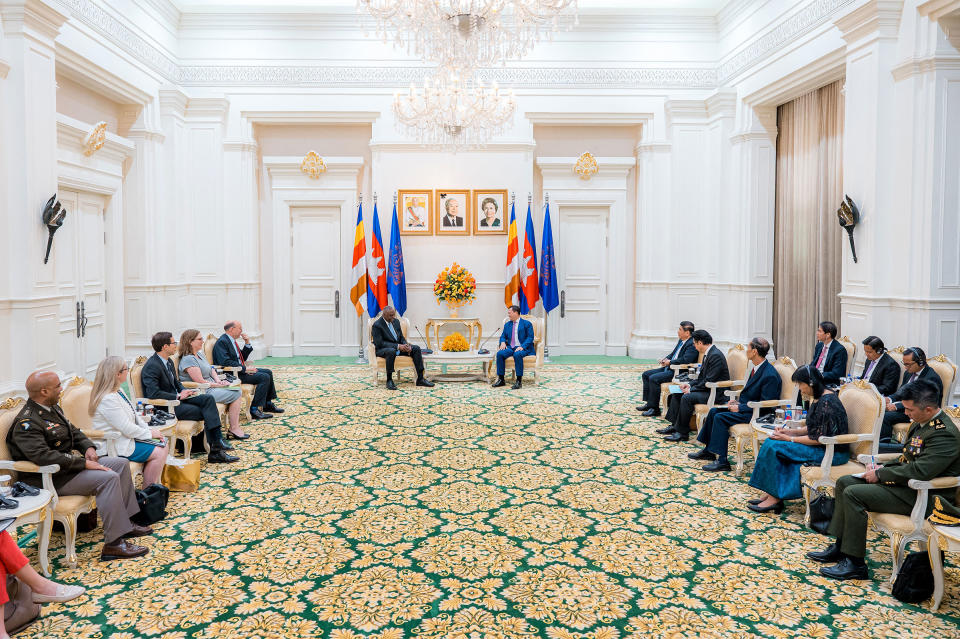Why Cambodia Matters to the U.S.-China Rivalry

Deputy chief of staff of the Southern Theater Commander of the Chinese People's Liberation Army Gao Xiucheng salutes in front of an honor guard during the Cambodian-China "Golden Dragon" drill at a military police base in Kampong Chhnang province on May 16, 2024. Credit - Tang Chhin Sothy—AFP/Getty Images
Little could be more symbolic of the power struggle playing out in Southeast Asia than what is happening on the outskirts of Ream National Park, in southern Cambodia. China is building a naval base on the site of a former U.S.-built military facility, and appears to be settling in for the long haul. Vessels of the People’s Liberation Army have been docked in the area for months, and the two countries have conducted a series of substantial “Golden Dragon” joint military exercises from the nearby Sihanoukville Autonomous Port. China used the opportunity to showcase their army of “robodogs”—four-legged robots with rifles mounted on their backs—to the world’s media. These drills first began in 2016, shortly after Cambodia canceled joint exercises with the United States.
Relations between China and Cambodia have moved apace in recent years. Details of the Ream naval base built with Chinese aid were first reported in 2019. And, this year, in a further deepening of ties, Chinese-owned companies are due to start work on the Funan Techo canal, a 112-mile, $1.7 billion project that will connect the capital to the Gulf of Thailand. Upon completion, the canal could divert traffic from the Mekong River and establish a trade route for China, through Laos and Cambodia, that cuts out the need for passage through an increasingly pro-Western Vietnam. China and Cambodia have a “build-operate-transfer” financing agreement, which will see it remain in China’s hands for at least 50 years.
For China, this control serves a greater strategic purpose. In Cambodia, and in the regime of Hun Manet, it now has an “ironclad ally” beholden on its investment. Around 40% of Cambodia’s $10 billion foreign debt is owed to China. And this gives President Xi Jinping, and his ruling-CCP, enormous clout.

The U.S. and Vietnam recently upgraded their relationship in an effort to counter this threat of Chinese creep in Southeast Asia. Just last month, a U.S. warship was driven away from the Paracel Islands in the South China Sea by the Chinese military, after it allegedly crossed into its territory. While another U.S. ally, the Philippines, is currently engaged in a fierce diplomatic battle over disputed territory in this region, which has resulted in the ramming and water-cannoning of Philippine ships. Although an international tribunal has rejected China’s expansive claims to areas of the South China Sea, it has persisted in occupying and building out several new islands, as well as maintaining a military presence across the region.
The role of Cambodia in China’s power-play within the Indo-Pacific cannot be understated. The autocratic Manet regime is a critical ally for China. The Chinese Foreign Minister was the first foreign official to congratulate, and then meet with, him following his inauguration as Prime Minister in 2023. And there is an increasing crossover in the tactics—and adoption of certain technologies, such as mass surveillance tools including CCTV, facial recognition software, and internet “firewall” technologies—that are being used to monitor and suppress regime critics, trade unionists, and activists. Independent news outlets have been shuttered, and female journalists, in particular, have become targets of harassment and many forced into exile.
Read More: Why I'm Alarmed By What's Happening in Cambodia
Unfortunately, the U.S. response has so far been muted. On a visit to Cambodia this month, U.S. Defence Secretary Lloyd Austin said that his ambitions with Manet were to “sit down and talk about how [we] might have a more positive and optimistic path in the future.” The visit was “not about securing significant deliverables and achievements.” This suggests a fundamental misread of what is happening in Southeast Asia. While the Biden Administration seems to perceive Cambodia as an amenable partner, Manet is double-dealing Beijing and Washington.

Evidence for this includes Cambodia’s repeated attempts to engage with U.S. officials to join the Washington-backed Indo-Pacific Economic Framework (IPEF). At the same time, the Manet government continues to court investment from China, which remains its top direct investor.
For those in Washington, who are increasingly concerned by the rise of China and the looming threats to Western democracy not just in Southeast Asia but around the world, a reset is required with countries like Cambodia. The current all carrot, no stick approach risks further democratic decline in Cambodia and the growth of Chinese influence.
Last year, Democrat and Republican lawmakers sought to bring the Manet regime to greater heel, with the threat of targeted sanctions against key figures suppressing democratic institutions, political freedoms, and human rights in the country. Their draft congressional bill also called for a more defined set of U.S. policies toward Cambodia. While this congressional effort ultimately failed to get sufficient traction, it is the kind of approach that is essential to give teeth to U.S. ambitions to counter China’s influence in the region.
This is a critical moment, both for the U.S. and Southeast Asia. Treading lightly with repressive leaders such as Manet risks normalizing their continued assault on the freedoms and liberties of citizens of this region. It also begs the question of U.S. lawmakers, who are speaking out on the need to push back at Chinese creep in this region, but not doing enough to safeguard the values of democracy that they, and the citizens of Southeast Asia, so care for.
Contact us at letters@time.com.


